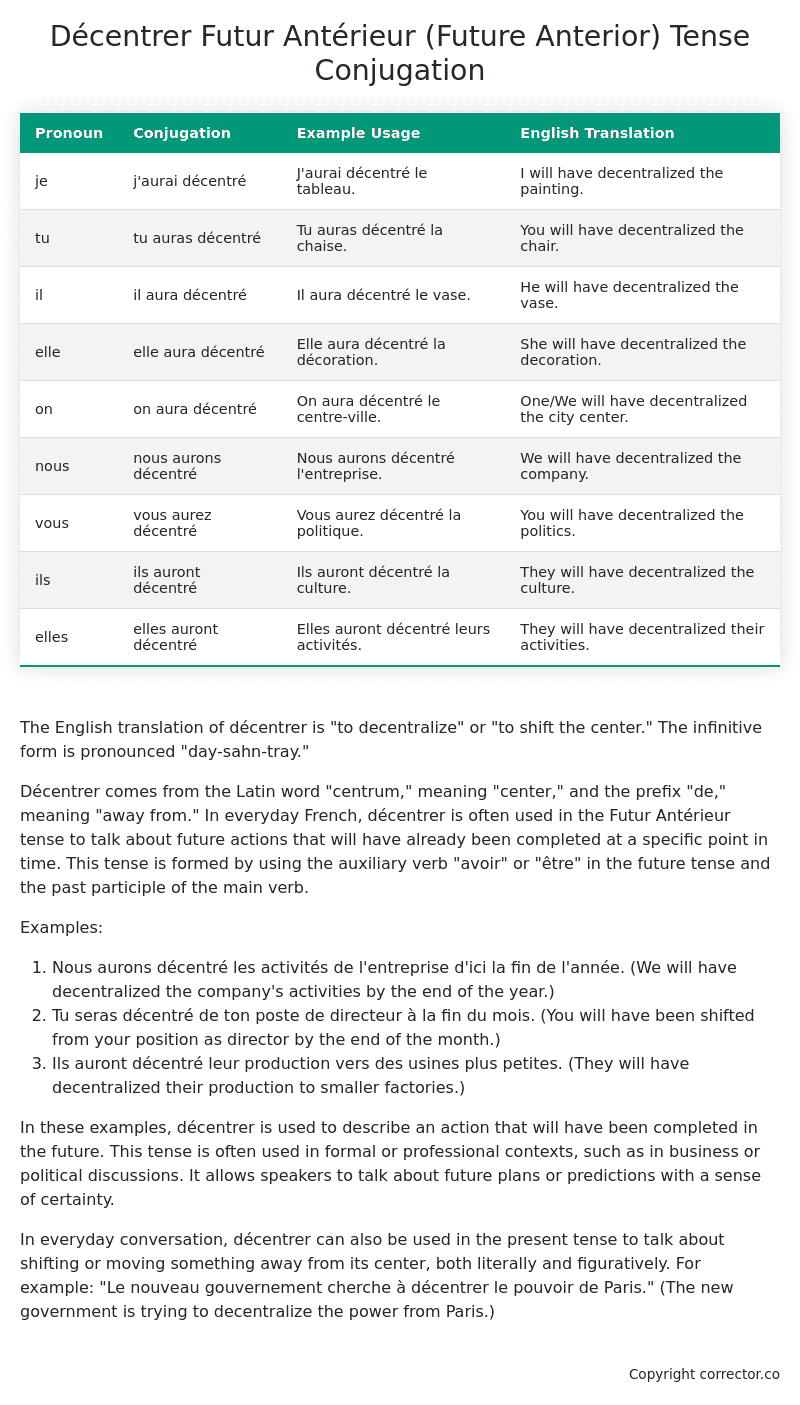Futur Antérieur (Future Anterior) Tense Conjugation of the French Verb décentrer
Introduction to the verb décentrer
The English translation of décentrer is “to decentralize” or “to shift the center.” The infinitive form is pronounced “day-sahn-tray.”
Décentrer comes from the Latin word “centrum,” meaning “center,” and the prefix “de,” meaning “away from.” In everyday French, décentrer is often used in the Futur Antérieur tense to talk about future actions that will have already been completed at a specific point in time. This tense is formed by using the auxiliary verb “avoir” or “être” in the future tense and the past participle of the main verb.
Examples:
- Nous aurons décentré les activités de l’entreprise d’ici la fin de l’année. (We will have decentralized the company’s activities by the end of the year.)
- Tu seras décentré de ton poste de directeur à la fin du mois. (You will have been shifted from your position as director by the end of the month.)
- Ils auront décentré leur production vers des usines plus petites. (They will have decentralized their production to smaller factories.)
In these examples, décentrer is used to describe an action that will have been completed in the future. This tense is often used in formal or professional contexts, such as in business or political discussions. It allows speakers to talk about future plans or predictions with a sense of certainty.
In everyday conversation, décentrer can also be used in the present tense to talk about shifting or moving something away from its center, both literally and figuratively. For example: “Le nouveau gouvernement cherche à décentrer le pouvoir de Paris.” (The new government is trying to decentralize the power from Paris.)
Table of the Futur Antérieur (Future Anterior) Tense Conjugation of décentrer
| Pronoun | Conjugation | Example Usage | English Translation |
|---|---|---|---|
| je | j’aurai décentré | J’aurai décentré le tableau. | I will have decentralized the painting. |
| tu | tu auras décentré | Tu auras décentré la chaise. | You will have decentralized the chair. |
| il | il aura décentré | Il aura décentré le vase. | He will have decentralized the vase. |
| elle | elle aura décentré | Elle aura décentré la décoration. | She will have decentralized the decoration. |
| on | on aura décentré | On aura décentré le centre-ville. | One/We will have decentralized the city center. |
| nous | nous aurons décentré | Nous aurons décentré l’entreprise. | We will have decentralized the company. |
| vous | vous aurez décentré | Vous aurez décentré la politique. | You will have decentralized the politics. |
| ils | ils auront décentré | Ils auront décentré la culture. | They will have decentralized the culture. |
| elles | elles auront décentré | Elles auront décentré leurs activités. | They will have decentralized their activities. |
Other Conjugations for Décentrer.
Le Present (Present Tense) Conjugation of the French Verb décentrer
Imparfait (Imperfect) Tense Conjugation of the French Verb décentrer
Passé Simple (Simple Past) Tense Conjugation of the French Verb décentrer
Passé Composé (Present Perfect) Tense Conjugation of the French Verb décentrer
Futur Simple (Simple Future) Tense Conjugation of the French Verb décentrer
Futur Proche (Near Future) Tense Conjugation of the French Verb décentrer
Plus-que-parfait (Pluperfect) Tense Conjugation of the French Verb décentrer
Passé Antérieur (Past Anterior) Tense Conjugation of the French Verb décentrer
Futur Antérieur (Future Anterior) Tense Conjugation of the French Verb décentrer (this article)
Subjonctif Présent (Subjunctive Present) Tense Conjugation of the French Verb décentrer
Subjonctif Passé (Subjunctive Past) Tense Conjugation of the French Verb décentrer
Subjonctif Imparfait (Subjunctive Imperfect) Tense Conjugation of the French Verb décentrer
Subjonctif Plus-que-parfait (Subjunctive Pluperfect) Tense Conjugation of the French Verb décentrer
Conditionnel Présent (Conditional Present) Tense Conjugation of the French Verb décentrer
Conditionnel Passé (Conditional Past) Tense Conjugation of the French Verb décentrer
L’impératif Présent (Imperative Present) Tense Conjugation of the French Verb décentrer
L’infinitif Présent (Infinitive Present) Tense Conjugation of the French Verb décentrer
Struggling with French verbs or the language in general? Why not use our free French Grammar Checker – no registration required!
Get a FREE Download Study Sheet of this Conjugation 🔥
Simply right click the image below, click “save image” and get your free reference for the décentrer Futur Antérieur tense conjugation!

Décentrer – About the French Futur Antérieur (Future Anterior) Tense
Construction
Common Everyday Usage Patterns
Interactions with Other Tenses
For example
Summary
I hope you enjoyed this article on the verb décentrer. Still in a learning mood? Check out another TOTALLY random French verb conjugation!


